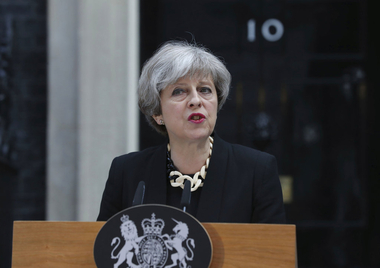UK election pauses, for second time, after London attack

LONDON (AP) — For the second time in two weeks, Britain's election campaign paused Sunday for grief and reflection in the aftermath of a deadly attack — and the issue of security vaulted back to the top of the political agenda.
The main political parties suspended national campaigning after seven people were killed and almost 50 hospitalized in a vehicle and knife attack Saturday night in the bustling London Bridge area. The election campaign was earlier halted for three days in the wake of the May 22 concert bombing in Manchester, which killed 22 people.
Prime Minister Theresa May said Thursday's election wouldn't be halted by the latest attack, because "violence can never be allowed to disrupt the democratic process."
That sentiment was echoed by opposition Labour Party leader Jeremy Corbyn, who said "those who wish to harm our people, divide our communities and attack our democracy will not succeed." Liberal Democrat leader Tim Farron said "the remainder of this campaign must be a collective showing of defiance and pride in our democratic values."
Only the right-wing U.K. Independence Party, who had no members of Parliament in the 650-seat House of Commons before the election was called, declined to pause campaigning. Leader Paul Nuttall said "I refuse to suspend campaigning because this is precisely what the extremists would want us to do."
But even with campaigning suspended, May made a strongly-worded — and inevitably political — statement in front of her 10 Downing St. office, arguing that "things need to change" in the fight against international terrorism.
May said that Britain was facing a new threat from copycat attacks, and "it is time to say 'enough is enough.'" She called for international agreements to curb online extremism, said longer jail sentences might be needed for terrorism offenses and argued that there is "far too much tolerance of extremism in our country."
Many saw the speech as a rebuff to Corbyn, a socialist who is often painted by May's Conservatives as soft on terrorism.
Steven Fielding, professor of politics at the University of Nottingham, said it was "about as close as you can get to a campaign speech while pretending to be uniting the nation at this moment of crisis."
After the Manchester attack, most analysts said that May was the politician most likely to benefit, because she is the incumbent leader and security is usually seen as a Conservative strength.
But opinion polls suggest the Conservatives' once-commanding lead over Labour was narrowing even before the bombing and has continued to do so, after some lackluster campaigning and unpopular social-policy announcements from May.
Corbyn has also criticized Conservative cuts to police budgets that saw the number of officers nationwide fall by almost 20,000 between 2010 and 2016 — years when May, as home secretary, was in charge of policing.
Resuming the election campaign Sunday evening, Corbyn said, "You cannot protect the public on the cheap."
"The police and security services must get the resources they need, not 20,000 police cuts," he said.
Fielding said it's hard to say whether the London Bridge attack and its aftermath will sway voters. The election is just four days away, and many people have already voted by postal ballot.
He said May and Corbyn "will both say they are not playing politics with this, but they both are."
"But maybe these are messages that play to their core votes: Theresa May, security and him (Corbyn) talking about austerity. It may be they are reinforcing their existing base."
___
By Jill Lawless. Copyright Associated Press.
The Gayly - 6/4/2017 @ 1:45 p.m. CST





